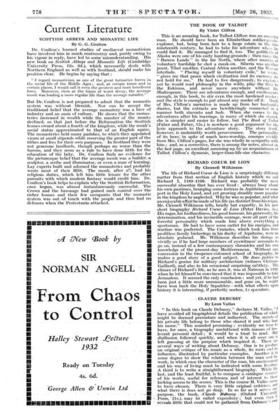Current Literature
SCOTTISH ABBEYS AND MONASTIC LIFE By G. G. Coulton Dr. Coulton's learned studies of mediaeval monasticism have involved-him in much controversy and, partly owing to his vigour in reply; have led to smile' misunderstanding. His new book on Scottish. Abbeys and. Monastic Life (Cambridge University Press, 12s. 6d.),. which necessarily deals with Northern England as well as with Scotland, should make his position clear. He begins by saying that : " I regard monasticism as one of the great formative forces in the social life. of the Middle Ageti . and, at certain times and in certain places, I would call it even the greatest and most beneficent force. Moreover, (siren at the 'times of worst decay, the average monk was leading amore regular life than the average outsider."
But Dr. Coulton .is not prepared to admit that the monastic system was without blemish.. Nor can he accept the traditional -belief -that the average monastery: was a hive of industry and an oasis of culture. He shows that the monas- teries increased in wealth while- the number of the monks declined, so that just before the ReformatiOn the Scottish houses owned about a fourth of the kingdom, while the monk's social status approximated to that of an • English aquire. The monasteries held many parishes; to which they appointed vicars at small stipends while reserving the greater part of the tithes and fees for-their own purpOses.- In Scotland they were not generous landlords, though perhaps no worse. than the barons, and they seem as a rule to, have done little for the education of the laity. Dr. Coulton finds no evidence for the picturesque belief that the average 'monk was a builder, a sculptor, a scribe and illuminator, -or even, a man 'of learning. Lay experts built and adorned the monasteries and probably wrote most of their MSS. The -monk, after all, -had' his religious duties, which left him little leisure for the other pursuits with which modern fantasy would credit him. . Dr. Coulton's book helps to explain why the Scottish Reformation, once begun, was almost instantaneously -successful. The Crown and the baronage had gained such control over'-the richer houses and their few occupants that the monastic system was out of touch with the people and thus had no defences when the Protestants- attacked.
















































 Previous page
Previous page